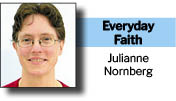
“Be careful you don’t spill that on your clothes,” my husband warned my son one time when he was dyeing Easter eggs.
“Dad, it’s DYE — it washes out!” my son confidently declared.
The rest of the family exploded in laughter.
Where my son had gathered with great confidence such a backward notion, none of us knew. But by our response, he knew now that his presumption was wrong.
Thankfully he took our laughter good-naturedly — a necessary skill to survive our usual household banter — and moved on, realizing the truth that to dye something means literally to stain it.
Hard to admit
It is not easy to admit when we are wrong. By human nature imbued with natural competitiveness, we inherently want to be on the “winning” side, the right side, God’s side.
Sometimes, however, we complicate things and try to twist facts in order to make it seem like we are still right.
This can happen when we are trying to justify habits that lead us to sinful behavior or explain why we can hold a grudge against a certain person, for example. We can become so headstrong in these justifications that we cannot even see that they are wrong.
But fact remains fact, and truth remains truth. So, to admit that we are wrong requires asking for God’s grace to be completely humble before Him and recognize the sins we need to repent.
Humility before God
To be humble before God means recognizing what is in your heart and presenting it to Him in all honesty, to see your heart as He sees it and give it to Him with all its darkness and error.
He can change that darkness to light if we truly empty our hearts of ourselves and allow Him to occupy our hearts instead.
“He must increase, but I must decrease” (John 3:30).
So often we can get so preoccupied with justifying ourselves and forget that we must strive to be mere instruments of God, allowing Him to work through us instead of us working for ourselves.
Jesus said, “I am the way and the truth and the life. No one comes to the Father except through me. If you know me, then you will also know my Father. From now on you do know him and have seen him” (John 14: 6-7).
“Do you not believe that I am in the Father and the Father is in me?” Jesus said. “The words that I speak to you I do not speak on my own. The Father who dwells in me is doing his works” (John 14: 10).
Striving to be like Jesus, we must allow God to overtake our hearts, purify them of any wrong they harbor, and perform works in our daily lives according to His will. In this way, then, we are not living for ourselves but for Him who can touch the lives of those around us.
The more we practice allowing God to occupy our hearts, the less we will get caught up in justifying faulty presumptions.
Sin dyes our souls
To make room in our hearts for God to reside, our wrongs must be regularly removed in Confession. Sin, like dye in fact, does not just “wash out” of our souls of our own accord.
If we die in a state of grace, time in Purgatory will ultimately purify remaining stains on our souls before we can one day be united with God in Heaven.
The trick is to try to avoid staining our souls in the first place.
Julianne Nornberg, mother of four children, is a teacher’s aide at St. John the Baptist School in Waunakee.

